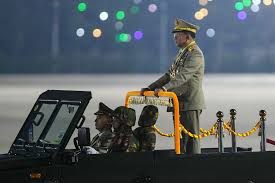The military government in Myanmar has announced that its long-promised elections will begin on December 28, 2025, even as the country continues to face a deadly civil war that has left large parts of the territory outside its control.
The Union Election Commission released a statement on Monday confirming the first phase of the multi-party general election. It said other phases will be announced later. However, many citizens and international observers see the exercise as an attempt by junta chief Min Aung Hlaing to retain power in another form.
Myanmar has been in crisis since February 2021, when the military ousted the civilian government of Aung San Suu Kyi after alleging electoral fraud. The coup sparked mass protests, which later turned into armed resistance across the country.
Today, several areas are controlled by pro-democracy fighters and powerful ethnic armed groups, many of whom have vowed not to allow elections in their territories. Analysts believe this situation could limit the reach of the polls and spark fresh violence.
For ordinary citizens, the election is viewed with suspicion. “I think this election is only being held to give power to military dictators until the world ends,” a 63-year-old man from Rakhine State said. “I don’t think the election will hold any significance for the people.”
Another displaced woman in Mandalay gave a more cautious view. “If the country will be made more stable and peaceful because of the election, we want to participate,” she said.
Since the coup, thousands of people have been killed, more than 3.5 million displaced, and over half of the country pushed into poverty. The military, however, insists that elections will bring stability. It has even promised cash rewards to opposition fighters who surrender their weapons.
International observers, including the United Nations, have condemned the upcoming election as a “fraud.” They argue that with Aung San Suu Kyi still in detention and opposition lawmakers sidelined, the polls cannot be free or fair.
The junta has also introduced new laws to control dissent. Critics or protesters of the election risk up to 10 years in prison, while damaging ballot papers or intimidating voters could attract up to 20 years.
Conflict monitors warn that violence may increase as the election date approaches. Already, the junta has launched heavy air strikes and introduced conscription to boost its fighting strength. In response, resistance groups have scored some victories, though the military has recently regained key settlements.
A national census held last year showed the scale of the challenge. Authorities admitted they could not collect data from 19 million of Myanmar’s 51 million people because of “security constraints.” This highlights the difficulty of holding a nationwide vote while war continues.
With Min Aung Hlaing still serving as acting president and army chief, analysts say the election is unlikely to change the country’s political direction. Instead, it may entrench military dominance while deepening divisions among opposition groups over whether to take part or boycott the process.
